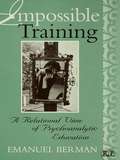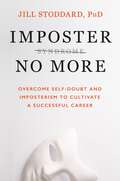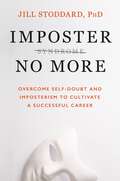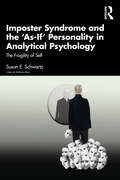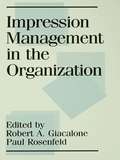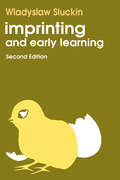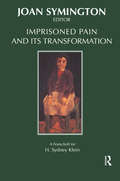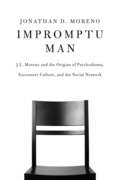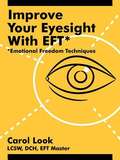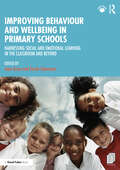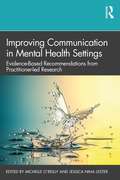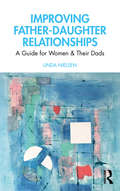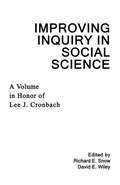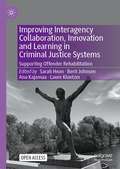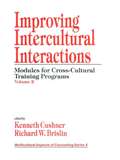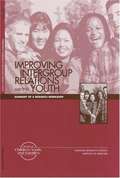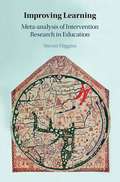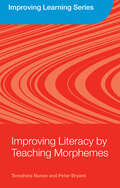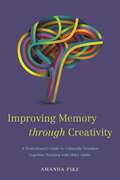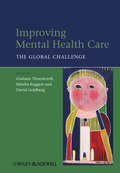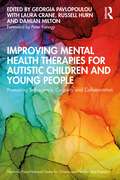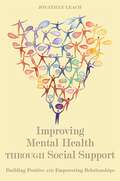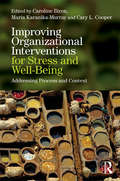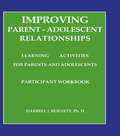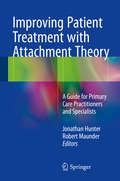- Table View
- List View
Impossible Training: A Relational View of Psychoanalytic Education (Relational Perspectives Book Series #26)
by Emanuel BermanOver the past century psychoanalysis has gone on to establish training institutes, professional societies, accreditation procedures, and models of education, thus bringing into uneasy alliance all three impossible pursuits. In Impossible Training: A Relational View of Psychoanalytic Education, Emanuel Berman turns his attention to the current status and future prospects of this daunting project. Berman is ideally suited to tackle the impossibility of psychoanalytic education. A graduate of two psychoanalytic institutes, one in Israel and one in America, he has devoted much of his professional life to psychoanalytic education and the organizational issues embedded in it. In Impossible Training, Berman describes the complex emotional and organizational dynamics of psychoanalytic training. Placing these issues within the context of major controversies in psychoanalytic history, he shows how generations of students have either idealized a "proper analytic identity," which evolves into a persecutory ideal, or rebelled against these standards. Are such persecuting and infantilizing trends inherent in analytic training, he asks, or can psychoanalytic education transcend them through changes in its structure and rules? For Berman, the relational and intersubjective trends in contemporary psychoanalysis call for changes in analytic supervision, not least of which is heightened attentiveness to the many relationships that gain expression in the supervisory process. Envisioned in this relational manner, supervision can become a more personal experience, less guarded, and more conducive to the development of a fertile transitional space between supervisor and supervisee. Anchoring his consideration of the present in the controversies of the past, Berman concludes by considering the mission of psychoanalytic educators today: to provide trainees with the resources to cope creatively with the as yet unknown challenges of tomorrow.
Imposter No More: Overcome Self-Doubt and Imposterism to Cultivate a Successful Career
by Jill, PhD StoddardA personal and professional guide to the latest research on imposterism and psychological flexibility, IMPOSTER NO MORE is the professional&’s handbook to combating &“impostor syndrome&” and overcoming self-doubt to achieve career success. Dr. Jill Stoddard is a recovered imposter. For years, she was convinced that the only reason she was accepted into a competitive grad school program was because her father knew the program director. Dr. Stoddard isn't alone in this: deep down, the majority of successful people question their professional legitimacy a good amount of the time. Why do we do this, and how can we stop? Although she's in recovery, Dr. Stoddard still struggles with feelings of imposterism. She works through them with psychological flexibility, the ability to be present with all thoughts, emotions, physical sensations, and urges, fully and without defense, while making conscious, deliberate choices based on what deeply matters to a person. Essentially, we're not attempting to change the substance of the thoughts and feelings that naturally occur to us; instead, we change the way we relate to those thoughts and feelings, so we aren't caught up in constant battle to control them. Throughout Imposter No More, Dr. Stoddard lays the groundwork for understanding the imposter phenomenon; she outlines the traps professionals often fall into regarding their imposter feelings, and provides actionable steps for cultivating psychological flexibility to be able to choose bold career moves despite self-doubt and imposterism.
Imposter No More: Overcome Self-doubt and Imposterism to Cultivate a Successful Career
by Jill A. StoddardA personal and professional guide to the latest research on imposterism and psychological flexibility, Imposter No More is the professional's handbook to combatting 'impostor syndrome' and overcoming self-doubt to achieve career success. Dr Jill Stoddard is a recovered imposter. For years, she was convinced that the only reason she was accepted into a competitive grad school programme was because her father knew the programme director. Dr Stoddard isn't alone in this: deep down, the majority of successful people question their professional legitimacy a good amount of the time. Why do we do this, and how can we stop? Although she's in recovery, Dr Stoddard still struggles with feelings of imposterism. She works through them with psychological flexibility, the ability to be present with all thoughts, emotions, physical sensations and urges, fully and without defence, while making conscious, deliberate choices based on what deeply matters to a person. Essentially, we're not attempting to change the substance of the thoughts and feelings that naturally occur to us; instead, we change the way we relate to those thoughts and feelings, so we aren't caught up in constant battle to control them. Throughout Imposter No More, Dr Stoddard lays the groundwork for understanding the imposter phenomenon; she outlines the traps professionals often fall into regarding their imposter feelings, and provides actionable steps for cultivating psychological flexibility to be able to choose bold career moves despite self-doubt and imposterism.
Imposter Syndrome and The ‘As-If’ Personality in Analytical Psychology: The Fragility of Self
by Susan E. SchwartzThis insightful book explores the ‘as-if’ personality through the lens of Jungian analytical psychology, illuminating how the same forces that can disturb personal development relationally, socially and culturally are equally an impetus toward expressing and relating with one's more complete self. The book describes persons expressing an ‘as if’ personality as facing a conundrum around whether to hide or expose the truth of who they are. It describes the analytic container as a place of growth from that place, affecting person and culture, self and other. Using a myriad of clinical examples (across a range of cultures, contexts and personal experiences), the author describes people who are moving through feelings of not belonging, sexual addiction, ageing, the cultural influence of social media, the role of the father, and body image challenges. All these issues reveal the valuable recognition of the unconscious- a hallmark of Jungian analytical psychology- incorporates the dissociated others into selfhood. The theories of French psychoanalysts Andre Green on absence and the negative, Julia Kristeva on abjection, French philosopher Jacques Derrida on Narcissus and Echo and American philosopher Judith Butler on precarity expand the Jungian analytical thought to reflect the multiplicity of the psyche. Using understandable language to interweave various psychoanalytical and philosophical frameworks, Imposter Syndrome and the ‘As-If’ Personality in Analytical Psychology: The Fragility of Self is both accessible to general readers and highly relevant to professional analysts, therapists, clinicians and social workers.
Impression Management in the Organization
by Paul Rosenfeld Robert A. GiacaloneImpression management theory has been popular in sociology and social psychology for many years. This volume offers the first comprehensive application of impression management theory to organizational settings. Researchers and practitioners in organizational settings have recently been using this theory as an explanatory model to focus on the roles and identities that "social actors" utilize in interpersonal situations. The theory of impression management provides a framework for the techniques and strategies people use in order to look good as well as the excuses and justifications they employ to avoid looking bad.
Imprinting and Early Learning
by Wladyslaw SluckinWhat is imprinting and what role does it play in the early development of the individual? What is its theoretical importance for understanding the mechanisms of instinct and learning? What is its significance in the development of the young of our own species? This book attempts to answer all these questions.In recent years imprinting has attracted much interest. This has been in no small measure the result of the admirable writings of Konrad Lorenz. The continued interest in this field of research has been bound up with the realization among students of behavior that imprinting and imprinting-like processes may be highly significant in the ontogenetic development of very many species, possibly including our own. The study of imprinting has become an area of collaboration between zoologists, who were the initiators of the research, and psychologists, who promptly took it up and extended it.Imprinting and Early Learning is a compendium of the data and experimental reports on the youthful study of imprinting and early learning-a progress report that traces the history of interest in the theory of imprinting and similar processes, considers imprinting side by side with related concepts and empirical studies, reviews the full range of experiments that illuminate the characteristic nature of imprinting, elucidates the relationship of imprinting to conditioning and early learning, and points out the implications of imprinting for work in educational, social and abnormal psychology.
Imprisoned Pain and Its Transformation
by Joan SymingtonIn this chapter Anne Alvarez describes how supervision with Sydney Klein played a decisive part in transforming her understanding of the importance of the grammar of interpretation—that not all interpretations have to unmask hidden desires on the negative side but, rather, can help the evolving process of growth and understanding. This is particularly important in borderline patients in whom such unmasking interpretations may be ego-depleting in that they do not take into account the immediate meaning of the child’s communication.
Impromptu Man
by Jonathan D. Moreno"Impromptu Man captures the remarkable impact of a singular genius, J.L. Moreno, whose creations-the best-known being psychodrama-have shaped our culture in myriad ways, many unrecognized. The record will be set straight for all time by this can't-put-down biography, a tribute by Jonathan D. Moreno to his father's masterly legacy." -DANIEL GOLEMAN, author of Emotional Intelligence: Why It Can Matter More Than IQJ.L. Moreno (1889-1974), the father of psychodrama, was an early critic of Sigmund Freud, wrote landmark works of Viennese expressionism, founded an experimental theater where he discovered Peter Lorre, influenced Martin Buber, and became one of the most important psychiatrists and social scientists of his time. ??A mystic, theater impresario and inventor in his youth, Moreno immigrated to America in 1926, where he trained famous actors, introduced group therapy, and was a forerunner of humanistic psychology. As a social reformer, he reorganized schools and prisons, and designed New Deal planned communities for workers and farmers. Moreno's methods have been adopted by improvisational theater groups, military organizations, educators, business leaders, and trial lawyers. His studies of social networks laid the groundwork for social media like Twitter and Facebook. ??Featuring interviews with Clay Shirky, Gloria Steinem, and Werner Erhard, among others, original documentary research, and the author's own perspective growing up as the son of an innovative genius, Impromptu Man is both the study of a great and largely unsung figure of the last century and an epic history, taking readers from the creative chaos of early twentieth-century Vienna to the wired world of Silicon Valley.Jonathan D. Moreno, called the "most interesting bioethicist of our time" by the American Journal of Bioethics, is a professor at the University of Pennsylvania and a Senior Fellow at the Center for American Progress.
Improve Your Eyesight with Eft*: *Emotional Freedom Techniques
by Carol LookBased on an experiment conducted by EFT Master, Carol Look, "Improve Your Eyesight with EFT" invites you to improve your vision by releasing pent up emotions stored in your eyes. Emotions such as fear, guilt, anger and shame show up in every other part of our anatomy and physiology, why not in our eyesight? Considering that few doctors or lay people even entertain the idea that our eyesight could be improved by balancing our energy system with a simple method such as Emotional Freedom Techniques (EFT), the final results of the experiment were nothing short of fantastic. Approximately 75% of participants reported between a 15-75% improvement in their vision. . just from tapping on acupressure points while focusing on their emotions! EFT is the ideal tool to address emotional blocks that have been preventing you from seeing clearly.
Improving Behaviour and Wellbeing in Primary Schools: Harnessing Social and Emotional Learning in the Classroom and Beyond
by Jean Gross Sarah SeleznyovThis accessible resource provides a vivid and practical guide to social and emotional learning and will help primary schools tackle and improve behaviour and wellbeing. With content written by teachers and used successfully in real classrooms, chapters include powerful stories from teachers about their work and the impact it has had. Developed within a theoretical framework of evidence-based strategies, the resources included are fully illustrated with photographs from classrooms and draw upon a useful bank of downloadable resources and proformas. Taking the reader through a journey of how a group of schools worked together to develop practical and effective approaches, this essential resource features: Tried and tested strategies for improving behaviour and wellbeing Ready-to-use classroom resources – lesson slides; top picture-books for teaching about emotions; 20 simple exercises to help children stay calm; playground conflict resources and a progression in learning emotion vocabulary from Reception to Year 6 Powerful stories from individual teachers about their work and its impact An in-depth understanding of research evidence on what works in tackling social, emotional and mental health needs from best-selling author and expert Jean Gross Children’s social, emotional and mental health needs have never been of more concern to teachers than they are now — this book genuinely brings theory to life and is essential reading for today’s primary teachers, SENCOs, support staff and safeguarding leads.
Improving Communication in Mental Health Settings: Evidence-Based Recommendations from Practitioner-led Research
by Michelle O’ReillyImproving Communication in Mental Health Settings draws on empirical studies of real-world settings to demonstrate contemporary practice-based evidence, providing effective strategies for communicating with patients/clients in mental health settings. The book integrates clinical experience and language-based evidence drawn from qualitative research. Drawing on studies that utilize scientific language-based approaches such as discourse and conversation analysis, it focuses on social interaction between professionals and patients/clients to demonstrate effective communication practices. Chapters are led by clinical professionals and feature a range of mental health settings, different mental health conditions and types of patient/client, and evidence-based recommendations. This book is an essential guide for professionals working in mental health and/or social work, and those training or working in clinical areas of mental health practice.
Improving Father-Daughter Relationships: A Guide for Women and their Dads
by Linda NielsenImproving Father-Daughter Relationships: A Guide for Women and Their Dads is essential reading for daughters and their fathers, as well as for their families and for therapists. This friendly, no-nonsense book by father-daughter relationships expert, Dr. Linda Nielsen, offers women and their dads a step-by-step guide to improve their relationships and to understand the impact this will have on their well-being. Nielsen encourages us to get to the root of problems, instead of dealing with fallout, and helps us resolve the conflicts that commonly strain relationships from late adolescence throughout a daughter’s adult years. Showing how we can strengthen bonds by settling issues that divide us, her book explores a range of difficult issues from conflicts over money, to the daughter’s lifestyle or sexual orientation, to her parents’ divorce and dad’s remarriage. With quizzes and real-life examples to encourage us to examine beliefs that are limiting or complicating the connection between fathers and daughters, this guide helps us feel less isolated and enables us to create more joyful, honest, enriching relationships.
Improving Inquiry in Social Science: A Volume in Honor of Lee J. Cronbach
by David E. Wiley Richard E. SnowThis volume celebrates Lee J. Cronbach's considerable contributions to the methodology of social and behavioral science. Comprised of chapters written by colleagues and contemporaries of the highly influential scholar, it offers a range of ideas, perspectives, and new approaches to improving social science inquiry.
Improving Interagency Collaboration, Innovation and Learning in Criminal Justice Systems: Supporting Offender Rehabilitation
by Sarah Hean Berit Johnsen Anu Kajamaa Laure KloetzerThis Open Access edited collection seeks to improve collaboration between criminal justice and welfare services in order to help prepare offenders for life after serving a prison sentence. It examines the potential tensions between criminal justice agencies and other organisations which are involved in the rehabilitation and reintegration of offenders, most notably those engaged in mental health care or third sector organisations. It then suggests a variety of different methods and approaches to help to overcome such tensions and promote inter-agency collaboration and co-working, drawing on emerging research and models, with a focus on the practice in European and Scandinavian countries. For academics and practitioners working in prisons and the penal system, this collection will be invaluable.
Improving Intercultural Interactions: Modules for Cross-Cultural Training Programs, Volume 2
by Dr Richard W. Brislin Kenneth CushnerTaking an educational model for counselling, this volume presents training modules relevant for a variety of circumstances from the world of business to that of education. Included throughout are practical exercises and self-assessment questions which promote cultural awareness. The volume is a companion to Improving Intercultural Interactions - the third volume in the Multicultural Aspects of Counseling series. It builds upon Volume Three to address a new cluster of topics specific to various types of intercultural experience. These include: ethics; ethnocultural identification; conflict and mediation across cultures; empathy; and cross-cultural communication.
Improving Intergroup Relations Among Youth: Summary Of A Research Workshop
by Forum On AdolescenceA report on Improving Intergroup Relations Among Youth
Improving Learning: Meta-analysis of Intervention Research in Education
by Professor Steven HigginsImproving Learning centres on the findings from different areas of education-focused research that support evidence-informed teaching and contextualises these results to optimise decision-making in schools. It also describes the origins and principles of meta-analysis in education and how this identifies the successes in improving learning in classrooms. Moreover, it explains the thinking behind the 'Teaching and Learning Toolkit' and similar approaches, which seek a big-picture overview of research findings. The advantages and disadvantages of this approach are explored with practical examples. Additionally, it identifies the issues in using research evidence in education and the steps that can be taken to improve this. It is not a manual on how to conduct a meta-analysis; instead the focus is on developing understanding of the approach in order to present its strengths and weaknesses. This understanding can advance critical engagement and effective use to improve educational outcomes for children and young people.
Improving Literacy by Teaching Morphemes (Improving Learning)
by Peter Bryant Terezinha NunesWith reports from several studies showing the benefits of teaching young children about morphemes, this book is essential reading for anyone concerned with helping children to read and write. By breaking words down into chunks of meaning that can be analyzed as complete units rather than as strings of individual letters, children are better able to make sense of the often contradictory spelling and reading rules of English. As a result, their enjoyment of learning about words increases, and their literacy skills improve. Written by leading researchers for trainee teachers, practising teachers and interested parents, this highly accessible and innovative book provides sound, evidence-based advice and materials that can be used to help teach children about morphemes, and highlights the beneficial effects of this approach.
Improving Memory through Creativity: A Professional's Guide to Culturally Sensitive Cognitive Training with Older Adults
by Amanda PikeCreativity stimulates older adults both mentally and emotionally and has numerous cognitive and social benefits. Providing culturally-sensitive strategies for improving memory through creativity, this timely book outlines innovative techniques and gives essential insight into effective clinical work in a world with an increasing number of diverse older adults and incidences of Alzheimer's disease. Amanda Alders Pike clearly explains how to structure sessions and use artistic creativity to improve memory, mood and socialization. She covers everything from how to introduce art materials and techniques, to how to enhance cross-cultural interaction. Graphs, charts, and tables illustrate how artistic creativity can parallel cognitive training to provide optimal benefits to a wide audience of older adults, and accompanying online material is provided for use in sessions and workshops.
Improving Mental Health Care
by Mirella Ruggeri David Goldberg Graham ThornicroftWritten by many of the world's leading practitioners in the delivery of mental health care, this book clearly presents the results of scientific research about care and treatment for people with mental illness in community settings. The book presents clear accounts of what is known, extensively referenced, with critical appraisals of the strength of the evidence and the robustness of the conclusions that can be drawn. Improving Mental Health Care adds to our knowledge of the challenge and the solutions and stands to make a significant contribution to global mental health.
Improving Mental Health Therapies for Autistic Children and Young People: Promoting Self-agency, Curiosity and Collaboration (Anna Freud)
by Peter Fonagy Laura Crane Damian Milton Russell HurnThis unique, collaborative book, featuring contributions from autistic and non-autistic experts, presents cutting-edge thinking on mental health and service transformation in relation to autistic children and young people (CYP) and their families.Investigating how to implement collaborative approaches to supporting autistic CYP's mental health, this book considers ways for professionals to share power and co-design models of support, promoting self-agency and supportive environments for autistic acceptance and wellbeing. Each chapter includes reflections and vignettes from autistic CYP and allies, key questions and thinking points for readers to consider. The book also includes a link for an e-library with multimedia material with the top take aways for clinicians such as animations, flyers and recorded interviews.The book will be of immense interest to individuals working with autistic CYP and their families in mental health at any level.
Improving Mental Health through Social Support: Building Positive and Empowering Relationships
by Jonathan LeachSocial support is the everyday assistance offered by family, friends, neighbours and colleagues, as well as the foundations of support in a range of non-clinical settings, and plays a vital role in a person's mental health and wellbeing. This book examines the nature of social support and offers a practical approach to how it can be enhanced. Focusing on the relationships between service users and supporters , it examines service users' experiences of issues of identity, stigma, social exclusion and social networks. Individual chapters look in depth at how social support is enacted in close relationships, educational institutions and in the world of employment. The nature of 'community' is explored with particular reference to how service users can be supported into greater engagement with social networks. Demonstrating the importance of social perspectives on mental health, this book is essential reading for practitioners, students and educators in mental health, social and community work, community mental health nursing and occupational therapy.
Improving Organizational Interventions For Stress and Well-Being: Addressing Process and Context
by Cary L. Cooper Maria Karanika-Murray Caroline BironThis book brings together a number of experts in the field of organizational interventions for stress and well-being, and discusses the importance of process and context issues to the success or failure of such interventions. The book explores how context and process can be incorporated into program evaluation, providing examples of how this can be done, and offers insights that aim to improve working life. Although there is a substantial body of research supporting a causal relationship between working conditions and employee stress and well-being, information on how to develop effective strategies to reduce or eliminate psychosocial risks in the workplace is much more scarce, ambiguous and inconclusive. Indeed, researchers in this field have so far attempted to evaluate the effectiveness of organizational interventions to improve workers’ health and well-being, but little attention has been paid to the strategies and processes likely to enhance or undermine interventions. The focus of this volume will help to overcome this qualitative-quantitative divide. This book discusses conceptual developments, practical applications, and methodological issues in the field. As such it is suitable for students, practitioners and researchers in the fields of organizational psychology and clinical psychology, as well as human resources management, health & safety, medicine, occupational health, risk management and public health.
Improving Parent-Adolescent Relationships: Learning Activities For Parents and adolescents
by Darrell J. BurnettFirst published in 1992. Routledge is an imprint of Taylor & Francis, an informa company.
Improving Patient Treatment with Attachment Theory
by Robert Maunder Jonathan HunterThis book emphasizes interpersonal relationships as a frequently overlooked, yet crucial element in today's healthcare system and describes the utility of attachment theory in understanding and managing patients with medical and surgical illness. Sections on the fundamentals of attachment theory, specific patient populations, attachment-based interventions, and future directions comprehensively reflect our current knowledge. The summarized research demonstrates the value of attachment theory in approaching such common issues as non-adherence, strain in the healthcare worker-patient relationship, and somatoform complaints, as well as in modelling maladaptive stress responses and subsequent illness vulnerability. The contributing authors are internationally recognized researchers and teachers who have sought to make this volume accessible to anyone interested in using the positive aspects of interpersonal relationships to maximum advantage in the practice of healthcare.
